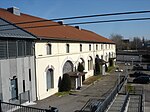The International Criminal Police Organization, commonly known as Interpol (UK: INT-ər-pol, US: -pohl), is an international organization that facilitates worldwide police cooperation and crime control. It is the world's largest international police organization. It is headquartered in Lyon, France, with seven regional bureaus worldwide, and a National Central Bureau in all 195 member states.Interpol was conceived during the first International Criminal Police Congress in 1914, which brought officials from 24 countries to discuss cooperation in law enforcement. It was founded on 7 September 1923 at the close of the five-day 1923 Congress session in Vienna as the International Criminal Police Commission (ICPC); it adopted many of its current duties throughout the 1930s. After coming under Nazi control in 1938, the agency had its headquarters in the same building as the Gestapo. It was effectively moribund until the end of World War II. In 1956, the ICPC adopted a new constitution and the name Interpol, derived from its telegraphic address used since 1946.Interpol provides investigative support, expertise and training to law enforcement worldwide, focusing on three major areas of transnational crime: terrorism, cybercrime and organized crime. Its broad mandate covers virtually every kind of crime, including crimes against humanity, child pornography, drug trafficking and production, political corruption, intellectual property infringement, as well as white-collar crime. The agency also facilitates cooperation among national law enforcement institutions through criminal databases and communications networks. Contrary to popular belief, Interpol is itself not a law enforcement agency.
Interpol has an annual budget of €142 million, most of which comes from annual contributions by member police forces in 181 countries. It is governed by a General Assembly composed of all member countries, which elects the executive committee and the President (currently Ahmed Naser Al-Raisi of the United Arab Emirates) to supervise and implement Interpol's policies and administration. Day-to-day operations are carried out by the General Secretariat, comprising around 1,000 personnel from over 100 countries, including both police and civilians. The Secretariat is led by the Secretary-General, currently Jürgen Stock, the former deputy head of Germany's Federal Criminal Police Office.
Pursuant to its charter, Interpol seeks to remain politically neutral in fulfilling its mandate, and is thus barred from interventions or activities that are political, military, religious, or racial in nature and from involving itself in disputes over such matters. The agency operates in four languages: Arabic, English, French and Spanish.











